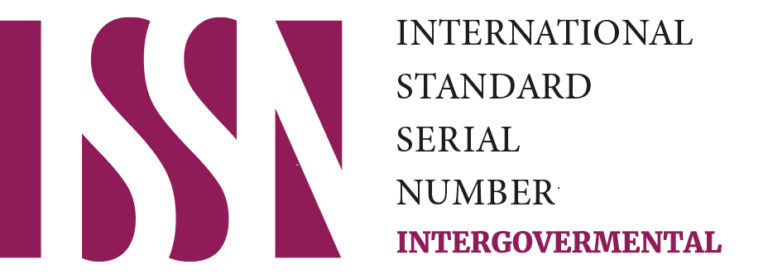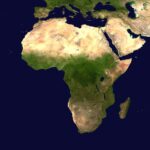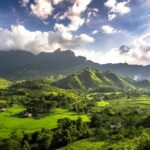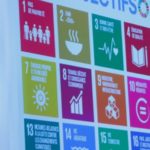Abstract
This paper explores the role of foreign policy in fostering a more effective national response to the challenges of climate change and how the Foreign Affairs Ministry can enhance Ghana’s engagement in global climate diplomacy. It concludes that climate change has become a foreign policy issue, sharing central features with other major foreign policy issues like terrorism, nuclear proliferation, including peace and security, energy security, trade and investment, and development cooperation. For more robust climate diplomacy, the full weight of Ghana’s diplomatic services must be employed. Climate change objectives must be advanced within the MFAs & RI policy objectives, and the MFA & RI and career diplomats should coordinate in developing strategic positions and leading in the climate negotiations. This would ensure the country achieves its national climate change targets, asserts itself as a proactive player, and enhances its engagement in international climate negotiations.
Introduction
There is a growing recognition that climate change is grossly undermining developing countries’ abilities to meet their national development targets,[1] of which Ghana is no exception. Located in a prime tropical zone, Ghana remains vulnerable to climate change. The country’s vulnerability is particularly evident in sea-level rise, increase in temperature, erratic rainfall patterns, excessive droughts, and flooding, among others.[2] Further climate change projections indicate more extreme weather events and potential changes in terrestrial and aquatic ecosystems, indirectly impacting communities’ livelihoods and food security.[3] Following the threat of climate change to its long-term objective of becoming a fully-fledged middle-income economy, the government of Ghana is pursuing a coordinated domestic policy action that integrates adaptation, mitigation,[4],[5],[6], and other climate-related policies[7] within broader development policies and planning to address the impact of climate change on the economy. However, one government cannot solve climate change alone because its implications do not abide by arbitrary administrative borders; it is considered an “international discourse bordering on foreign policy.”[8] The solution calls for a unified effort of the entire international community – and this is where diplomacy comes into play. The purpose of diplomacy has always been to secure or pursue the foreign policy agenda of states,[9] and more elaborately to communicate, interact, maintain, contact, and negotiate with states and other international actors[10] – to find solutions to complex global challenges which are common to the parties involved[11] and through a nonviolent approach[12] – thus necessary for linking domestic, foreign and international climate policy. The art of diplomacy requires the diplomats’ ability to bridge several differences – cultural, geopolitical, and ideological—and conflicting state interests of all kinds.[13] The global action to combat climate change has set the catalyst for diplomatic relations as a global-level strategic and coordinated response to support the transformation towards a climate-neutral economy hitherto, infusing stimulus into the entire spectrum of bilateral and multilateral relations. Achieving national climate targets and promoting ambitious climate action remains a strategic foreign policy priority.[14] Ghana cannot achieve its national targets without positioning climate change in its broader foreign policy context. An emphasis on climate change in foreign policy and the effective participation of the Ministry of Foreign Affairs and Regional Integration could be a significant vehicle for Ghana to achieve its national climate change targets and influence international climate change negotiations beyond advocacy for a development that ameliorates climate change. The article seeks to explore the role of foreign policy in fostering a more effective national response to the challenges of climate change and how the Foreign Affairs Ministry can enhance Ghana’s engagement in global climate diplomacy. This paper further reviews existing literature on climate diplomacy, climate change governance in Ghana, Ghana’s foreign policy, and her engagement in the international climate change negotiations. It also outlines the research methodology, presents and discusses climate change and foreign policy nexus, the Ministry of foreign Affairs’ role in the climate change processes, and draws conclusions and recommendations.
Climate change diplomacy
Climate diplomacy involves “building diplomatic capacity and systems to avoid dangerous climate change” – thus “the practice and process of creating the international climate change regime and ensuring its effective operation.”[15] It also encompasses diplomatic tools to support the ambition and functioning of the international climate change regime and reduce the impact climate change poses to the people’s peace, security, and prosperity.[16] Climate diplomacy ensures that national priorities are reflected in international climate negotiations, while the negotiations also promote additional domestic climate actions. Without this, efforts within the UNFCCC will be insufficient, and national efforts will also not be achieved. Domestic climate ambition and international climate ambition must be complementary. As the domestic climate policy sets out how ambitious we are at home, we should also expect to be ambitious at the international level. This iterates the needed focus on the strategic nexus of climate change and foreign policy in climate diplomatic processes. Hence, for robust climate diplomacy, the full weight of diplomatic services must be deployed, and national institutional architecture for implementing the UNFCCC must be effective.
Climate change governance in Ghana
The responsibility for ensuring effective implementation of climate change resides with an enhanced institutional arrangement. Within the Government, the Ministry of Environment, Science, Technology, and Innovation (MESTI) leads the formulation of climate change policies and supervises the implementation of the Convention and its Protocol activities within the country. While serving as the National Designated Authority (NDA) for the Clean Development Mechanism (CDM), MESTI also hosts the National Climate Change Committee (NCCC) and coordinates the regular preparation and implementation of the Nationally Determined Contributions. The EPA, an agency under MESTI, is responsible for the technical coordination of the implementation of climate programs and facilitates the preparation of international climate change reports in close collaboration with sector ministries. The agency serves as the National Focal Point (NFP) for the UNFCCC, the Inter-governmental Panel on Climate Change (IPCC), Climate Technology Centre and Network CTCN), and the Action for Climate Empowerment (ACE).[17] The Agency also administers environmental impact assessment projects, evaluates and promotes relevant climate technologies, and coordinates adaptation planning and mitigation assessment. The National Development Planning Commission (NDPC) and Ministry of Finance play critical roles in mainstreaming climate change issues into national development plans and budgeting. The NDPC ensures the integration of climate change issues into national planning, incorporates climate change indicators into the national results framework, and coordinates the preparation of sectoral and the national annual progress report. The Ministry of Finance (MoF) created the Natural Resources, Environment and Climate Change Unit under the Real Sector Division, now the Economic Research and Strategic Division, in 2010 to oversee, coordinate, and manage the financing of and support natural resources climate change activities. Through this Division, the Ministry tracks domestic and international climate finance inflows, prepares SDG compliance budget, including climate change, and facilitates the domestication of the SDGs in the country. The Division also serves as the National Designation Authority of the Green Climate Fund in Ghana. Besides that, several Ministries departments and Agencies (MDAs) have established focal units or teams to work on climate change issues in their respective ministries, including the Ministry of Food and Agriculture, Ministry of Local Government, and Decentralization and Rural Development, Forestry Commission, and the Energy Commission of Ghana.[18] Unfortunately, the list of principal institutions implementing the UNFCCC as indicated in Ghana’s Fourth National Communications failed to capture the Ministry of Foreign Affairs and Regional Integration.[19]
Ghana’s foreign policy
Article 40 of the 1992 constitution of Ghana contains the fundamental principles of the nation’s foreign policy.[20] Five broad principles are provided, including 1) promotion and protection of the interest of Ghana, 2) Promotion of respect for international law and treaty obligations, and 3) adhere to the principles enshrine in or, as the case may be, the aims and ideals of…other international organizations of which Ghana is a member. Ghana adopted a pragmatic outlook in seeking economic cooperation with several East and West countries.[21] Fruitful and mutually beneficial cooperation with the industrialized countries was pursued to procure the needed financial and technical assistance for the young nation’s economic programs. In this regard, the policy of non-alignment to which Ghana adhered served a useful purpose.[22] The policy does not imply an apathetic attitude but a necessity to formulate opinions on issues of global concern on their merit. In essence, Ghana’s decisions and actions at the international front is informed by its internal practices, ideologies, and interest and not necessarily guided by the logic of consequences. Though Ghana’s foreign policy has not primarily changed, it has gone under review to make it more positive and relevant to the change in the international environment – probably to emphasize that in this era of globalization, no state can exempt itself or avoid involvement in the international sphere. Although national efforts may handle some problems, issues that transcend national boundaries such as global warming, ecosystem destruction, pollution, and complex diseases and tasks such as maintaining economic stability can only be solved by collective means[23]– hence the need for multilateralism. Even in multilateralism, states still should pursue a foreign policy that contributes to their economic prosperity and enables them to play a more effective role in international politics. A good foreign policy would lead a state to fulfill its national interests and acquire a rightful place among the comity of nations. Hence, Ghana’s engagement in climate diplomacy since 1992 is thus recognizing that climate change is a critical foreign policy issue.
Ghana at the international climate change negotiations
Ghana signed the UNFCCC in 1992 and ratified the same through Ghana’s Parliament in September 1995. In 2005, Ghana ratified the Kyoto protocol and acceded to the Doha Amendment, which extends the Kyoto protocol to 2020. Ghana negotiates through the G77+ China Group, Like-Minded Developing countries, and frequently aligns with the Africa Group of Negotiators. Due to limited technical capacity and resources, Ghana’s participation in the negotiation between 1992 and 2001 was not consistent until 2009. Ghana’s participation became increasingly active thanks to the former Minister of Environment, Science, and Technology, Shirley Aryeetey, who actively mobilized financial resources to develop Ghana’s National Climate Change Policy. The country has undertaken a wide range of activities to ensure the effective implementation of the Convention. Ghana prepared and submitted its Nationally Determined Contributions (NDCs) in September 2015 in response to the Lima Call for Action and swiftly joined the Paris Agreement in September 2016. Ghanaian delegates have played several roles in the negotiations, including chairing the G77 and China Group in 1991 before adopting the UNFCCC in 1992, chairing the eleventh session of the conference of parties in Montreal, and serving as rapporteur for the session.[24] Ghana also hosted the 2008 Accra Climate Change Talks in preparation for that year’s COP14 meeting in Poland and the 2019 Africa Climate Week in Accra to raise ambition to implement the Nationally Determined Contributions and lead high-level close door meetings to advance action on clean air.[25] Additional roles that Ghanaians have played include coordinating the national adaptations plans for G77 and China, providing legal advice to the UNFCCC, reviewing national communications for the annex 1 countries, and being a member of the Executive Committee (ExCom) of Warsaw International Mechanism (WIM).[26] Despite the seeming active role of its envoys, Ghana has not been very active in advancing its national position in the climate negotiations. There has not been any clear-cut position Ghana brings to the Conference of Parties, nor has it demonstrated any solid national position in the negotiation besides the collective African position.[27] As a result, Ghana has never been assertive or a key influencer in climate negotiations.[28] Notwithstanding Ghana aligning with the African Group, it does not have a discernible voice.[29] Hence, it is not enough to sign up for groups but to have a solid position to keep the country focused.[30] Unfortunately, the National Climate Change Committee (NCCC), tasked to, among other things prepare a common Ghanaian position for the negotiations,[31] had ceased to function effectively, according to available reports.[32] Ghana was described as jumping on the bandwagon of climate agenda setters –thus, “we wait until someone sets the agenda, then we start running along instead of setting the agenda.”[33] The role of the MFAs and RI in the climate change processes at the national and international levels cannot be overemphasized –especially in the face of an emerging carbon market.
Methodology
The paper employed the qualitative research approach to explore the underlying meanings and patterns of climate and foreign policy relationships. It involved collecting primary and secondary data. Semi-structured interviews were used to collect primary data from state and non-state experts (with expertise and background in the subject matter) in Ghana, Colombia, Egypt, and South Africa – focusing on the climate change and foreign policy-making process and climate politics inside and outside Ghana. An open-ended interview guide was developed to facilitate the interviews. The semi-structured interview was complemented with a literature-based review of existing books, academic articles, and reports on foreign policy and climate change nexus. An expert purposive sampling[34] was employed to glean knowledge from individuals with expertise in foreign policy and climate diplomacy to make analytical generalizations based on theoretical analysis of the subject area. The study employed the inductive approach, particularly thematic analysis to analyze qualitative data and the semi-structured interviews. The paper employed a single case study approach[35] for a variety of reasons. Focusing on Ghana as the unit of analysis allowed the researcher to gain a more in-depth insight and understanding of a case study that has not yet been examined and offer flexibility in the evaluation and interventions by the key expert players.[36] The study spanned from November 2019 and November 2021, during my participation in the UN Climate change negotiations as an observer and Party in 2019 and 2021, respectively. The researcher had formal and informal conversations around the subject matter. I interviewed 12 key individuals who have worked in developing and implementing domestic and climate and foreign policies, including current and past UNFCCC negotiators and diplomats. Specifically, I interviewed Ghanaian officials and past and present negotiators. Respondents also included negotiators from Colombia, Egypt, and South Africa. This revealed national-level factors influencing the practicality of international climate diplomacy and the exciting lessons for Ghana and the broader audience. The interviews took place at the COP26 in Glasgow in 2021, and most of the respondents were present. A few were held via zoom, WhatsApp, and telephone. Most of the interviews were conducted anonymously.
Findings and Discussion
The paper presents and discusses climate change and foreign policy nexus and how the Ministry of Foreign Affairs and Regional Integrations can advance Ghana’s engagement in global climate diplomacy to make a case for the need to redefine its role in climate change processes.
Climate change and foreign policy nexus
Climate change has emerged as a global challenge that poses increasing challenges to human existence on earth. With its multidimensional threat, its impacts go beyond national borders. Climate change has become an essential pillar in national politics and global policy-making. The foreign policy aims to promote and protect the territorial integrity and the interests of the nations and their citizens.[37], [38] The central task of foreign policy is to minimize systemic risks to prosperity, stability, and security.[39] The nexus between climate change and foreign policy is thus widely acknowledged. Climate change shares central features with other major foreign policy issues like terrorism, nuclear proliferation, including peace and security, energy security, trade and investment, and development cooperation. Therefore, as the global community is seriously addressing issues of peace and stability, climate change must also be addressed as part of instability and fragility considerations. In essence, an era of climate diplomacy is required, one where climate risks are integrated into foreign climate policy agendas to prevent the next looming crisis. It is not a coincidence that upon Ghana’s third election as a non-permanent observer into the UN Security Council, the Foreign Minister hinted at the country’s commitment to addressing climate change as part of peace and security issues.[40] Hence, the role of Ghana’s MFAs and RI in the climate change processes at the national and international levels cannot be overemphasized.
Ghana and Foreign Policy on Climate Change
Ghana recognizes the considerable threat of climate change to key sectors of its economy.[41] Hence, policy, institutional, legal and regulatory frameworks on climate change in Ghana have significantly evolved[42] with several programs, strategies, plans, and actions designed around climate change.[43] Although Ghana is observed to be formulating national policies for environmental sustainability, there is no deliberate foreign policy plan for considering climate change in the country’s interactions with other nations. It is expected that after Ghana’s involvement in the 1992 Human and Environment Conference in Rio and the subsequent establishment of the Environmental Protection Council, now the Environmental Protection Agency, established by an Act of Parliament (Act 490), the country should have set its foreign policy priority for environmental protection and particularly, climate change. [44],[45],[46] With diplomacy perceived as the implementation of foreign policy,[47] it is inferred that Ghana’s engagement in climate diplomacy suggests the country probably has a foreign policy on climate change that it is implementing through its involvement in the negotiations. Unfortunately, the country has no clear-cut foreign policy on climate change. What exists are domestic policies on climate change.[48],[49],[50] Meanwhile, the complementarity between domestic climate ambition and international climate ambition is highly acknowledged. As the domestic climate policy sets out how ambitious we are at home, we should also expect to be ambitious at the international level. Although Ghana may not have formulated its foreign policy on climate change, it is engaged in climate diplomacy. But how effective Ghana is at the negotiation leaves much to be desired.[51],[52] Ghana cannot avoid having an explicit foreign policy on climate change[53]. A critical look at climate change from a foreign policy-making dimension is essential.[54] A clearly defined foreign policy on climate change and the meaningful involvement of the Ministry of Foreign Affairs officers in the negotiations would garner the necessary support to address climate change at the national level and advance and enhance the country’s engagement in the negotiations.[55], [56], [57], [58]
The Ministry of Foreign Affairs in climate negotiations
Ministries of Foreign Affairs (MFAs) exist to influence foreign policy-making with other ministries and executive agencies in-country and retain influence through their control of diplomatic service abroad.[59] The Ministry of Foreign Affairs and Regional Integration (MFA & RI) is responsible for Ghana’s foreign policy. To this end, the Ministry is the chief advisor to the Government in formulating Ghana’s foreign policy, including making recommendations on appropriate options, initiatives, and responses in light of unfolding domestic and international situations.[60] Consequently, the foreign minister, career diplomats, and the Ministry can do a lot on foreign policy issues like climate change. Nonetheless, climate diplomacy is not just the work of Ministries of Foreign Affairs (MFAs) – or the Ministries of Environment (MoE) – but an activity that draws upon the full range of government and non-government actors. However, metamorphosing into a foreign policy issue and the Ministry’s traditional function is to develop and implement foreign policies, it is ideal for the Ministry to take center stage in the climate negotiation.[61], [62], [63] It is not a coincidence that upon Ghana’s admission into the UN Security Council, the Foreign Minister hinted at the country’s commitment to addressing climate change as part of peace and security issues.
The role of Ghana’s Ministry of Foreign Affairs and Regional Integration in global climate diplomacy
Despite the patchy recognition of the importance of the MFA & RI in the climate negotiation process, Ghana has not fully taken advantage of the role of the Ministry in the climate negotiations. It is understood that the Ministry of Foreign Affairs is the one that defines the identities and foreign policies of their countries based on their identification as a permanent institution of the nations, suitable for the representation of their countries’ interests abroad. Unfortunately, as a foreign policy establishment, the country sees climate change as an environmental negotiation reserved for the Ministry of environment, hence the limited participation of the Ministry and integration into national foreign policy interests. Meanwhile, the impacts of climate change have become very intense, threatening our peace and security and development trajectory – and as literature has it, requires diplomatic efforts – hence the involvement of the Ministry of Foreign Affairs.
Unlike Brazil, Colombia, and Egypt, which recognize the role of the Ministry of Foreign Affairs in leading climate negotiations and developing national positions, and representing their interest, so far, Ghana has not yet explicitly defined its Foreign Ministry’s role in the climate negotiations. The Ministry of Foreign Affairs and Regional Integration does not actively participate in the climate negotiation process. The Ministry’s participation is often reserved for signing protocols, facilitating ratification instruments, and facilitating the President’s involvement and some of its foreign missions. Besides that, the Ministry has not been deliberately involved in any national process geared towards developing a national position to guide official delegates attending the climate negotiations –their role on the National Climate change Committee is ceremonial, according to responses from the Ministry. Representatives from Ghana may seem very active and vocal in the climate change negotiations. Still, those are individuals speaking from their experience and field of expertise and not necessarily through any consultative process.
The essential contribution of the MFA and RI to national and international climate change processes is recognized. Yet it is argued that it cannot be left at the purview of the Foreign Ministry alone[64],[65] instead be led by specialized institutions with the MFA & RI playing the supporting role.[66] The reasons are twofold; climate change has become a technical issue cutting across several disciplines, and diplomacy is no longer the preserve of professional diplomats – thus, it is not merely what professional diplomatic agents do. It could be carried out by other officials and by private persons[67],[68],[69],[70] and by extension other sectors with the technical expertise in the issues under discussion. In the meantime, climate diplomacy is characterized by different state actors with divergent cultures and geopolitical interests. Career diplomats are trained to deal with such issues[71] and bridge the many international differences and conflicting state interests, including strategic concerns.[72] The interdisciplinary nature of climate change and the involvement of technical people in the negotiations cannot be wished away. But considering the need to bridge international differences to secure a country’s foreign policy, the leadership role of career diplomats and the Ministry of Foreign Affairs in this process cannot be overemphasized.[73] Moreso, the assertiveness and strong positions of successful countries in climate negotiations are highly attributed to the leading role of diplomats and foreign ministries in the process.[74],[75] Although the Ministry may not have the ability to affect the national-level implementation of climate change actions, as definers of Ghana’s foreign policy and the quest to employ diplomatic skills in the negotiations, taking charge of every foreign policy-related issue, including climate change, would enhance the country’s assertiveness at the international level. If climate change is not brought out to the table of the foreign ministries, it will be treated as a minor issue taken care of by the environment ministers. A second look into Ghana’s MFA & RI’s role in the national and international climate change process is essential. Trained diplomats are encouraged to spearhead the process with solid support from technical experts because they understand the interest and tricks of their international counterparts.
Recommendations
Ghana’s climate change policy has demonstrated the country’s ambitious domestic action on climate change. Given that domestic climate ambition and international climate ambition must be complementary, the paper suggests that Ghana should develop a foreign policy on climate change to elevate the country’s regional and global reputation. Again, recognizing that climate change shares central features with foreign policy issues, the MFA and RI’s role in international relations should be redefined to include leading climate negotiations and mandatory coordination of the preparation of strategies and national positions, which will serve as an instruction for delegates attending the negotiations. The paper further indicates the importance of the MFA and RI for championing all diplomatic directives on climate change. Developing a top-level strategy under the leadership of the Ministry is vital for directing the inclusion of climate change at all levels of diplomacy. As the Ministry’s traditional function is to develop and implement foreign policies, it should take center stage in the climate negotiations with strong technical support.
Further to that, Ghana’s promise to address climate change as part of security issues calls for an intentional involvement of the Ministry and diplomats in the national and international climate processes. Although seasoned diplomats are equipped with negotiation skills, they may not have the required technical knowledge to forge climate agreements. The technical expertise of diplomats and the diplomatic capacity of climate experts should be developed to ensure intense climate diplomacy.
Conflict of Interest
The author states that there is no conflict of interest.
References
ADrexhage, John R and International Institute for Sustainable Development. Climate Change and Foreign Policy: An Exploration of Options for Greater Integration. Winnipeg, Man.: International Institute for Sustainable Development, 2007. https://www.deslibris.ca/ID/206272.
Agyemang-Bonsu, Akyamfour Asafo Boakye. Interview with Former National Focal Point for Ghana to the UNFCCC and the Former Manager for Mitigation and Transparency Support Sub-programme at UNFCCC Secretariat, 2 December 2021.
Appah-Sampong, Ebenezer. Interview with the Deputy Executive Director, Technical Services at Ghana’s Environmental Protection Agency, 10 November 2021.
Arndt, Channing, Felix Asante, and James Thurlow. ‘Implications of Climate Change for Ghana’s Economy’. Sustainability 7, no. 6 (4 June 2015): 7214–31. https://doi.org/10.3390/su7067214.
Asante, Felix Ankomah, Simon Bawakyillenuo, Neil Bird, Nella Canales Trujillo, Cynthia Addoquaye Tagoe, and Nicholas Ashiabi. ‘Climate Change Finance in Ghana’. Oversee Development Institute, 2015.
Barston, R. P. Modern Diplomacy. 3rd ed. Harlow: Pearson/Longman, 2006.
Benefoh, Akwasi. ‘Ghana’s Fourth National Communication to the United Nations Framework Convention on Climate Change’, 2020, 378.
Benefoh, Daniel Tutu, Anwti Boasiako-Amoah, Joseph Amankwa Baffoe, Raymond Abudu Kasie, and Samuel Dotse. ‘Institutional Arrangement for Implementing Ghana’s NDCS: Facilitating Implementation and Readiness for Mitigation (FIRM)’. Environmental Protection Agency, Ghana, 2017. http://www.lowcarbondev-support.org/-/media/Sites/FIRM_Facilitating_Implementation_and_Readiness_for_Mitigation/Final-Country-reports-Phase-2/Ghana-Country-report-NDCs-Institutions.ashx?la=da&hash=A9D2547C27FCD146C342661C0D782FA578320327.
Berridge, G.R. Diplomacy: Theory and Practice. Second. Houndmills, Basingstoke, Hampshire: Palgrave, 2002.
CCAC. ‘Ghana Leads High-Level Round-Table on Climate and Clean Air Actions during Africa Climate Week’. Climate & Clean Air Coalition, 22 March 2009. https://www.ccacoalition.org/en/news/ghana-leads-high-level-round-table-climate-and-clean-air-actions-during-africa-climate-week.
Dotse, Samuel, Reuben Tete Larbi, and Mathias Edetor. ‘Climate Change Negotiations and Advocacy: Twenty-Two Years of Ghana’s Participation’. In Climate Change in Ghana: The Human Dimension. ResearchGate, 2019.
Dr. Boasiako-Amoah, Antwi. Interview with Lead Negotiator for Ghana on Adaptation and Deputy Director and NAP Project Coordinator at EPA Ghana, 10 November 2021.
Ghana High Commission. ‘PRESS STATEMENT ON GHANA’S ELECTION TO THE UNITED NATIONS SECURITY COUNCIL FOR THE 2022-2023 TERM’, June 2021. https://ghanahighcommissionuk.com/PRESS-STATEMENT-ON-GHANA%E2%80%99S-ELECTION-TO-THE-UNITED-NATIONS-SECURITY-COUNCIL-FOR-THE-2022-2023-TERM.
‘Ghana’s Foreign Policy Guideline – Ministry of Foreign Affairs and Regional Integration’. Accessed 24 September 2021. https://mfa.gov.gh/index.php/foreign-policy/ghanas-foreign-policy-guideline/.
‘Ghana’s National Capacity for Transparency and Ambitious Climate Reporting’. The Global Environment Facility, 2018. https://www.thegef.org/project/strengthening-ghana-s-national-capacity-transparency-and-ambitious-climate-reporting.
Gibson, Hugh. The Road to Foreign Policy,. First Edition. Doubleday, Doran, and Co. Inc, 1944.
Government of Ghana. ‘Ghana’s Fourth National Communication to the United Nations Framework Convention on Climate Change’. Environmental Protection Agency, Ghana, 2020. https://www4.unfccc.int/sites/SubmissionsStaging/NationalReports/Documents/562873149_Ghana-NC4-2-Gh_NC4.pdf.
———. ‘Ghana’s Updated Nationally Determined Contribution to the UNFCCC_2021’. Ministry of Environment, Science, Technology and Innovation and Environmental Protection Agency, November 2021. https://www4.unfccc.int/sites/ndcstaging/PublishedDocuments/Ghana%20First/Ghana%27s%20Updated%20Nationally%20Determined%20Contribution%20to%20the%20UNFCCC_2021.pdf.
———. ‘The Constitution of the Republic of Ghana’, 1992.
Interviewee #5. Colombian Negotiators with the Ministry of Environment and Ministry of Foreign Affairs, 6 November 2021.
Interviewee #6. Egyptian negotiator with the Ministry of Foreign Affairs, 11 November 2021.
Interviewee #7. Interview with Ghanaian Legal Analyst and a negotiator, 30 November 2021.
Interviewee #8. Interview with a Young Ghanaian Negotiator within the African Group of Negotiators, 30 November 2021.
Jupp, Victor. The SAGE Dictionary of Social Research Methods. 1 Oliver’s Yard, 55 City Road, London England EC1Y 1SP United Kingdom: SAGE Publications, Ltd, 2006. https://doi.org/10.4135/9780857020116.
Leguey-Feilleux, Jean-Robert. The Dynamic of Diplomacy. Boulder, London: Lynne Rienner Publishers, 2009.
Mabey, Nick, Liz Gallagher, and Camilla Born. ‘Understanding Climate Diplomacy’. Third Generation Environmentalism: London, 2013.
Ministry of Environment, Science, Technology and Innovation. ‘National Climate Change Policy’. MESTI, 2013.
Nock, Mattew K., Bethany D. Michel, and Valerie I Photos. ‘Single-Case Research Designs’. In Handbook of Research Methods in Abnormal and Clinical Psychology. Los Angeles: Sage Publications, 2008.
Pohl, Benjamin. ‘Foreign Policy Responses to Climate Change: Addressing Risks, Seizing Opportunities’. adelphi, 2018. https://www.adelphi.de/en/project/foreign-policy-responses-climate-change-addressing-risks-seizing-opportunities.
Republic of Ghana. ‘Ghana’s Intended Nationally Determined Contribution (INDC) and Accompanying Explanatory Note’, 2015.
Ross, Carne. Independent Diplomat: Dispatches from an Unaccountable Elite. Crises in World Politics. Ithaca, N.Y: Cornell University Press, 2007.
UNFCCC. ‘Paris Agreement’. UNFCCC, 2015.
University, Euclid. Daryl Copeland- What Is Diplomacy- Why Does It Fail- How Can It Be More Effective-, 2016. https://vimeo.com/150540233.
‘What Is Climate Diplomacy? | Climate-Diplomacy’. Accessed 30 August 2021. https://climate-diplomacy.org/what-climate-diplomacy.
Yin, Robert K. Case Study Research: Design and Methods. SAGE, 2009.
[1] John R ADrexhage and International Institute for Sustainable Development, Climate Change and Foreign Policy: An Exploration of Options for Greater Integration (Winnipeg, Man.: International Institute for Sustainable Development, 2007), https://www.deslibris.ca/ID/206272.
[2] Ministry of Environment, Science, Technology and Innovation, ‘National Climate Change Policy’ (MESTI, 2013).
[3] Ministry of Environment, Science, Technology and Innovation.
[4] Akwasi Benefoh, ‘Ghana’s Fourth National Communication to the United Nations Framework Convention on Climate Change’, 2020, 378.
[5] Republic of Ghana, ‘Ghana’s Intended Nationally Determined Contribution (INDC) and Accompanying Explanatory Note’, 2015.
[6] Government of Ghana, ‘Ghana’s Updated Nationally Determined Contribution to the UNFCCC_2021’ (Ministry of Environment, Science, Technology and Innovation and Environmental Protection Agency, November 2021), https://www4.unfccc.int/sites/ndcstaging/PublishedDocuments/Ghana%20First/Ghana%27s%20Updated%20Nationally%20Determined%20Contribution%20to%20the%20UNFCCC_2021.pdf.
[7] Ministry of Environment, Science, Technology and Innovation, ‘National Climate Change Policy’.
[8] Akyamfour Asafo Boakye Agyemang-Bonsu, Interview with Former National Focal Point for Ghana to the UNFCCC and the Former Manager for Mitigation and Transparency Support Sub-programme at UNFCCC Secretariat, 2 December 2021.
[9] G.R. Berridge, Diplomacy: Theory and Practice, Second (Houndmills, Basingstoke, Hampshire: Palgrave, 2002), 1–3.
[10] Jean-Robert Leguey-Feilleux, The Dynamic of Diplomacy (Boulder, London: Lynne Rienner Publishers, 2009), 1.
[11] Berridge, Diplomacy: Theory and Practice, 27.
[12] Euclid University, Daryl Copeland- What Is Diplomacy- Why Does It Fail- How Can It Be More Effective-, 2016, https://vimeo.com/150540233.
[13] R. P. Barston, Modern Diplomacy, 3rd ed (Harlow: Pearson/Longman, 2006), 16–19.
[14] UNFCCC, ‘Paris Agreement’ (UNFCCC, 2015).
[15] Nick Mabey, Liz Gallagher, and Camilla Born, ‘Understanding Climate Diplomacy’ (Third Generation Environmentalism: London, 2013).
[16] ‘What Is Climate Diplomacy? | Climate-Diplomacy’, accessed 30 August 2021, https://climate-diplomacy.org/what-climate-diplomacy.
[17] Government of Ghana, ‘Ghana’s Fourth National Communication to the United Nations Framework Convention on Climate Change’ (Environmental Protection Agency, Ghana, 2020), 6, https://www4.unfccc.int/sites/SubmissionsStaging/NationalReports/Documents/562873149_Ghana-NC4-2-Gh_NC4.pdf.
[18] Government of Ghana, ‘Ghana’s Fourth National Communication to the United Nations Framework Convention on Climate Change’.
[19] Government of Ghana, 6–7.
[20] Government of Ghana, ‘The Constitution of the Republic of Ghana’, 1992, 36.
[21] ‘Ghana’s Foreign Policy Guideline – Ministry of Foreign Affairs and Regional Integration’, accessed 24 September 2021, https://mfa.gov.gh/index.php/foreign-policy/ghanas-foreign-policy-guideline/.
[22] ‘Ghana’s Foreign Policy Guideline – Ministry of Foreign Affairs and Regional Integration’.
[23] Leguey-Feilleux, The Dynamic of Diplomacy, 55.
[24] United Nations Framework Convention on Climate Change. Conference of the Parties on its eleventh session, Part One: Proceedings. (Montreal, Canada. 2005)
[25] CCAC, ‘Ghana Leads High-Level Round-Table on Climate and Clean Air Actions during Africa Climate Week’, Climate & Clean Air Coalition, 22 March 2009, https://www.ccacoalition.org/en/news/ghana-leads-high-level-round-table-climate-and-clean-air-actions-during-africa-climate-week.
[26] Samuel Dotse, Reuben Tete Larbi, and Mathias Edetor, ‘Climate Change Negotiations and Advocacy: Twenty-Two Years of Ghana’s Participation’, in Climate Change in Ghana: The Human Dimension (ResearchGate, 2019), 169.
[27] Interviewee #7, Interview with Ghanaian Legal Analyst and a negotiator, 30 November 2021.
[28] Interviewee #7.
[29] Interviewee #7.
[30] Interviewee #5, Colombian Negotiators with the Ministry of Environment and Ministry of Foreign Affairs, 6 November 2021.
[31] ‘Ghana’s National Capacity for Transparency and Ambitious Climate Reporting’ (The Global Environment Facility, 2018), 32, https://www.thegef.org/project/strengthening-ghana-s-national-capacity-transparency-and-ambitious-climate-reporting.
[32] Felix Ankomah Asante et al., ‘Climate Change Finance in Ghana’ (Oversee Development Institute, 2015), 19.
[33] Agyemang-Bonsu, Interview with Former National Focal Point for Ghana to the UNFCCC and the Former Manager for Mitigation and Transparency Support Sub-programme at UNFCCC Secretariat.
[34] Victor Jupp, The SAGE Dictionary of Social Research Methods (1 Oliver’s Yard, 55 City Road, London England EC1Y 1SP United Kingdom: SAGE Publications, Ltd, 2006), https://doi.org/10.4135/9780857020116.
[35] Robert K. Yin, Case Study Research: Design and Methods (SAGE, 2009).
[36] Mattew K. Nock, Bethany D. Michel, and Valerie I Photos, ‘Single-Case Research Designs’, in Handbook of Research Methods in Abnormal and Clinical Psychology (Los Angeles: Sage Publications, 2008).
[37] Moh. RH Daily Outlook: The importance of Foreign Policy, Published July 3, 2016. Accessed March 31, 2020. http://www.outlookafghanistan.net/editorialdetail.php?post_id=15678
[38] Hugh Gibson, The Road to Foreign Policy, First Edition (Doubleday, Doran, and Co. Inc, 1944).
[39] Benjamin Pohl, ‘Foreign Policy Responses to Climate Change: Addressing Risks, Seizing Opportunities’, adelphi, 2018, https://www.adelphi.de/en/project/foreign-policy-responses-climate-change-addressing-risks-seizing-opportunities.
[40] Ghana High Commission, ‘PRESS STATEMENT ON GHANA’S ELECTION TO THE UNITED NATIONS SECURITY COUNCIL FOR THE 2022-2023 TERM’, June 2021, https://ghanahighcommissionuk.com/PRESS-STATEMENT-ON-GHANA%E2%80%99S-ELECTION-TO-THE-UNITED-NATIONS-SECURITY-COUNCIL-FOR-THE-2022-2023-TERM.
[41] Channing Arndt, Felix Asante, and James Thurlow, ‘Implications of Climate Change for Ghana’s Economy’, Sustainability 7, no. 6 (4 June 2015): 7214–31, https://doi.org/10.3390/su7067214.
[42] Daniel Tutu Benefoh et al., ‘Institutional Arrangement for Implementing Ghana’s NDCS: Facilitating Implementation and Readiness for Mitigation (FIRM)’ (Environmental Protection Agency, Ghana, 2017), 13, http://www.lowcarbondev-support.org/-/media/Sites/FIRM_Facilitating_Implementation_and_Readiness_for_Mitigation/Final-Country-reports-Phase-2/Ghana-Country-report-NDCs-Institutions.ashx?la=da&hash=A9D2547C27FCD146C342661C0D782FA578320327.
[43] Benefoh, ‘Ghana’s Fourth National Communication to the United Nations Framework Convention on Climate Change’, 11–14.
[44] Interviewee #7, Interview with Ghanaian Legal Analyst and a negotiator.
[45] Ebenezer Appah-Sampong, Interview with the Deputy Executive Director, Technical Services at Ghana’s Environmental Protection Agency, 10 November 2021.
[46] Antwi Dr. Boasiako-Amoah, Interview with Lead Negotiator for Ghana on Adaptation and Deputy Director and NAP Project Coordinator at EPA Ghana, 10 November 2021.
[47] Leguey-Feilleux, The Dynamic of Diplomacy, 8.
[48] Ministry of Environment, Science, Technology and Innovation, ‘National Climate Change Policy’.
[49] Republic of Ghana, ‘Ghana’s Intended Nationally Determined Contribution (INDC) and Accompanying Explanatory Note’.
[50] Government of Ghana, ‘Ghana’s Updated Nationally Determined Contribution to the UNFCCC_2021’.
[51] Interviewee #7, Interview with Ghanaian Legal Analyst and a negotiator.
[52] Agyemang-Bonsu, Interview with Former National Focal Point for Ghana to the UNFCCC and the Former Manager for Mitigation and Transparency Support Sub-programme at UNFCCC Secretariat.
[53] Agyemang-Bonsu.
[54] Dr. Boasiako-Amoah, Interview with Lead Negotiator for Ghana on Adaptation and Deputy Director and NAP Project Coordinator at EPA Ghana.
[55] Interviewee #5, Colombian Negotiators with the Ministry of Environment and Ministry of Foreign Affairs.
[56] Interviewee #7, Interview with Ghanaian Legal Analyst and a negotiator.
[57] Appah-Sampong, Interview with the Deputy Executive Director, Technical Services at Ghana’s Environmental Protection Agency.
[58] Dr. Boasiako-Amoah, Interview with Lead Negotiator for Ghana on Adaptation and Deputy Director and NAP Project Coordinator at EPA Ghana.
[59] Berridge, Diplomacy: Theory and Practice.
[60] ‘Ghana’s Foreign Policy Guideline – Ministry of Foreign Affairs and Regional Integration’.
[61] Interviewee #6, Egyptian negotiator with the Ministry of Foreign Affairs, 11 November 2021.
[62] Appah-Sampong, Interview with the Deputy Executive Director, Technical Services at Ghana’s Environmental Protection Agency.
[63] ‘What Is Climate Diplomacy?’
[64] Agyemang-Bonsu, Interview with Former National Focal Point for Ghana to the UNFCCC and the Former Manager for Mitigation and Transparency Support Sub-programme at UNFCCC Secretariat.
[65] Barston, Modern Diplomacy, 1.
[66] Interviewee #8, Interview with a Young Ghanaian Negotiator within the African Group of Negotiators, 30 November 2021.
[67] University, Daryl Copeland- What Is Diplomacy- Why Does It Fail- How Can It Be More Effective-.
[68] Leguey-Feilleux, The Dynamic of Diplomacy, 101–22.
[69] Berridge, Diplomacy: Theory and Practice, 146.
[70] Carne Ross, Independent Diplomat: Dispatches from an Unaccountable Elite, Crises in World Politics (Ithaca, N.Y: Cornell University Press, 2007).
[71] Leguey-Feilleux, The Dynamic of Diplomacy, 9.
[72] Leguey-Feilleux, 9.
[73] Dr. Boasiako-Amoah, Interview with Lead Negotiator for Ghana on Adaptation and Deputy Director and NAP Project Coordinator at EPA Ghana.
[74] Dr. Boasiako-Amoah.
[75] Interviewee #7, Interview with Ghanaian Legal Analyst and a negotiator.






